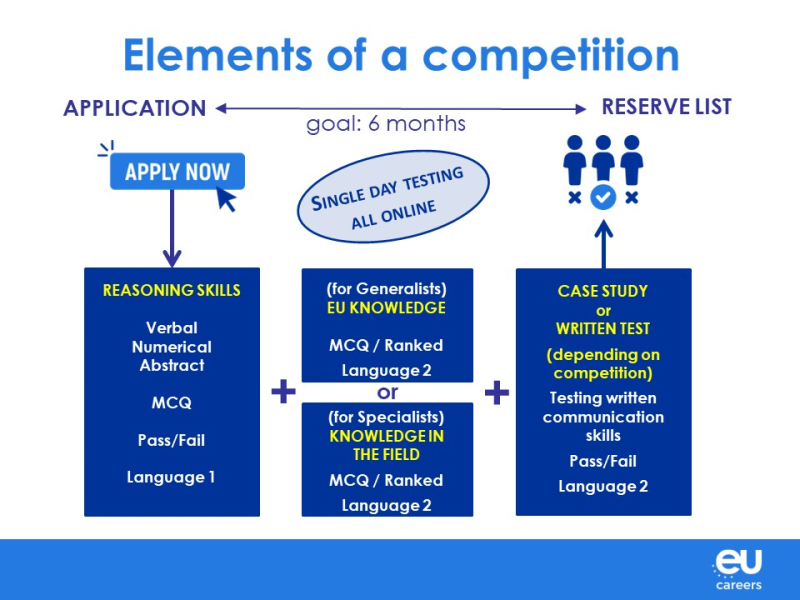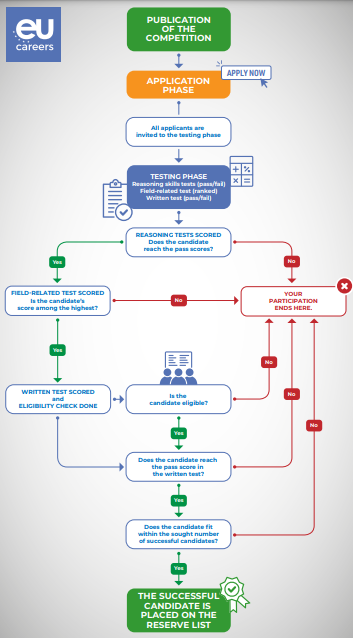
Introducing a faster, leaner and more accessible competition model!

On 31 January, EPSO’s governing body, the interinstitutional Management Board, decided to drop oral tests from EPSO’s selection procedures, as part of a fundamental rethink of the current selection process.
Competitions will put greater emphasis on candidates’ qualifications and on a set of written tests, all to be conducted in one testing session. All tests will be done online via remotely proctored testing.
With a ‘competition phase’ based exclusively on written tests, it will be possible for EPSO to strive to reduce competition timelines to just 6 months, and, eventually, less.
Following the competition, the selection board will draw up the reserve list containing the names of the successful candidates. The list is made available to the EU institutions and bodies for recruitment purposes.
The first competition under the new competition model was published on 22 June 2023 (Economics). Regular updates are available on EPSO’s website: Upcoming selection procedures | EU Careers (europa.eu), (we invite you to subscribe to this page to receive notifications).
The ‘Assessment Centre’ and its related oral tests, in place since 2010, ceases to exist.
However, candidates’ general competencies will still be reviewed via post-reserve list interviews by the recruiting services of the EU institutions that are hiring. The choice of whom to recruit remains entirely with the institutions themselves.
Speed: the aim is to complete open competitions within 6 months and eventually less (from the moment of publication to the establishment of the reserve list).
Efficiency: all tests will take place online, in one single testing session, therefore in just one day for each candidate.
Modernity: online testing is faster, more flexible, in line with today’s digitalised world, ‘greener’ and more accessible to the vast majority of candidates, wherever they are.
Transparency: the sources used for the creation of the EU knowledge test, to be used for generalist competitions, will be pre-published online by EPSO, levelling the playing field among candidates.
Quality: in the new EPSO competition model, successful candidates show satisfactory cognitive abilities, are among the best in field-related knowledge and in written communication/drafting skills. They have the right diploma and/or working experience.
Clear competencies: The general competency framework adopted by EPSO in April 2022 remains valid.
Diversity: with a faster, leaner and more accessible competition model, EPSO also wishes to stimulate applications by a more diverse pool of candidates.
Verbal, numerical and abstract reasoning tests
The verbal, numerical and abstract reasoning tests remain part of the selection procedures. Usually, results will not be ranked, one will only need a pass mark. The weight given to each of the three skills may vary depending on the profile being selected.
An EU Knowledge test for generalist competitions
A Field-related Multiple-choice Questionnaire for specialist competitions
The focus of the EU knowledge test, for instance, will be on meaningful substance questions related to the functioning of the EU, its policies and procedures.
Candidates will have the opportunity to check online the sources used to create this test, making it accessible even to those who have never studied EU affairs at university or worked previously in this field. The source materials used for the creation of this test will be published at the same time of publication of the Notice of Competition.
No source materials will be published by EPSO for the field-related multiple-choice questionnaire for specialist competitions.
Case Study
Some competitions will include a case study to assess candidates’ written communication skills (i.e. drafting skills).
Written test
With EPSO’s move towards a full 24-language regime a new type of test will be introduced by EPSO in its selection procedures, as of 2024: the written test, a test aimed at assessing candidates’ written communication skills. The written test will replace the case study*.
Under the term written test, there are three different types of tests that EPSO will use according to the needs expressed by the recruiting services for each competition:
- Written test (WT) related to the field(s) of the competition, assessing only written communication skills.
- Field-related written test (FRWT), assessing written communication skills and knowledge in the relevant field of the competition.
- Free-text Essay on EU matters (EUFTE), assessing only written communication skills.
Candidates will be required to respond to the test assignment(s) based on the documentation provided by EPSO and related to the field(s) of the competition, as specified in the notice of competition.
The written test is not a language test. Candidates will be assessed on the basis of the specific ‘anchors’ listed below (‘anchors’ are the elements taken into consideration by test markers (i.e. assessors) when assessing a given competency).
‘Anchors’ for written communication skills:
The candidate:
- Writes concisely without use of unnecessary words and sentences.
- Presents subject-matter in an understandable way.
- Adapts/tailors their writing to match the intended audience and purpose.
- Uses the information provided to deal with the assignment.
- Written communication is structured with a logical flow of ideas.
*Case studies will continue to be used for some ongoing competitions.
A digital skills test
A digital skills test will be introduced for some competitions, in line with the needs of the EU institutions and bodies that EPSO serves.
- Publication of the Notice of Competition
- Self-assessment of eligibility via Experience Assessment Survey Instrument (EASI)*, followed by application
- Reasoning skills tests on a pass/fail basis
- EU knowledge test for generalist competitions or Field-related Multiple-choice Questionnaire (FRMCQ) for specialist competitions - ranked
- Digital skills test (when applicable)
- Case study (assesses drafting skills) corrected only for those with the best results in EU knowledge or FRMCQ
- Written test aimed at assessing, mainly, the candidates' written communication skills. For more information, please visit our dedicated page
- Eligibility checks at an appropriate stage (final verification before placing on the Reserve List; checking of second language, if necessary)
- Reserve List (database of successful candidates, published by EPSO at the end of each competition, used by EU institutions for their specific recruitment needs)
- ‘Single ‘Request for Review’ window – Candidates have the option to request a review of the decision establishing their test results if they believe there has been a material error or a breach of the competition procedure rules, which may impact the results of the selection process. This request can only be done once, in line with the procedures contained in the notice of competition.
* EASI is a tool aimed at providing optional feedback to interested candidates to help them understand better their likelihood of admission (eligibility) to a competition, based on their qualifications and professional experience, compared to the requirements laid down in the Notice of Competition.
The feedback will only be shared with candidates themselves and will not be shared with any member of the Selection Board.



